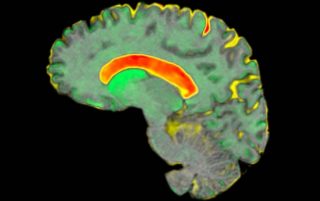Major Wellcome Trust award will drive forward translational research in Huntington’s disease
A team of researchers from UCL and the Universities of Cambridge and Glasgow led by Professor Sarah Tabrizi have been granted a prestigious Wellcome Trust Collaborative Award.

The 5-year, £3.3 million investment will support research to help our understanding of disease mechanisms in Huntington’s Disease (HD) and identify robust outcome measures for future disease-modifying clinical trials. This work will not only give hope to the HD community but will provide valuable insights into other more common neurodegenerative diseases.
HD is a devastating inherited neurodegenerative condition for which there is currently no effective treatment to slow down the disease process. This new project will probe disease mechanisms at the molecular, cellular and systems level. In collaboration with co-applicant Professor Darren Monckton at the University of Glasgow, it will investigate instability within the HD gene which is known to drive disease progression. Mechanisms underlying the gene’s effect on molecular processes will be elucidated within cells and in mouse models of HD, in collaboration with co-applicant Professor Gill Bates, UCL Queen Square Institute of Neurology. Ongoing collaborations with industrial partners, Roche and Ionis Pharmaceuticals, will allow assessment of the potential therapeutic benefit of drugs directly targeting these pathways.
While ongoing trials currently seek to modify the disease in symptomatic patients, the HD Centre’s HD Young Adult Study has shown that the earliest signs of neuronal damage occur up to 24 years before the expected onset of clinical symptoms; this is likely to be the optimum time to intervene with treatments to slow or halt disease progression.
Building on this research and exploiting strong links between the Wellcome Centre for Human Neuroimaging and the HD Centre and Centre for Medical Image Computing, co-applicants Professor Geraint Rees and Dr Gary Zhang will use advanced imaging techniques including 7T and magnetoencephalography to examine brain structure and function in far-from-onset gene carriers. This information will be complemented by novel cognitive testing, led by co-applicant Professor James Rowe at Cambridge University and biofluid collection, supported by CHDI, a not-for-profit charitable foundation.
This ambitious project will advance current understanding of mechanisms underlying HD and exploit this knowledge for therapeutic development.
“For the first time we have a realistic chance of finding treatments which actually slow down the disease process. Ideally we aim to administer the most successful therapies to gene carriers years before widespread damage has occurred, with the hope that we can prevent or at least significantly delay disease onset,” said Prof Tabrizi, Principal Investigator of the Wellcome Centre for Human Neuroimaging’s Huntington’s Disease team and Director of UCL’s Huntington’s Disease Centre.
Prof Michael Hanna, Director of UCL Queen Square Institute of Neurology, said:
“I am delighted that Sarah and her colleagues have been awarded this important grant from the Wellcome Trust which fits perfectly with the translational neuroscience strategy of the ION and will fund fundamental mechanistic research into finding and testing prevention therapies for Huntington’s disease.”